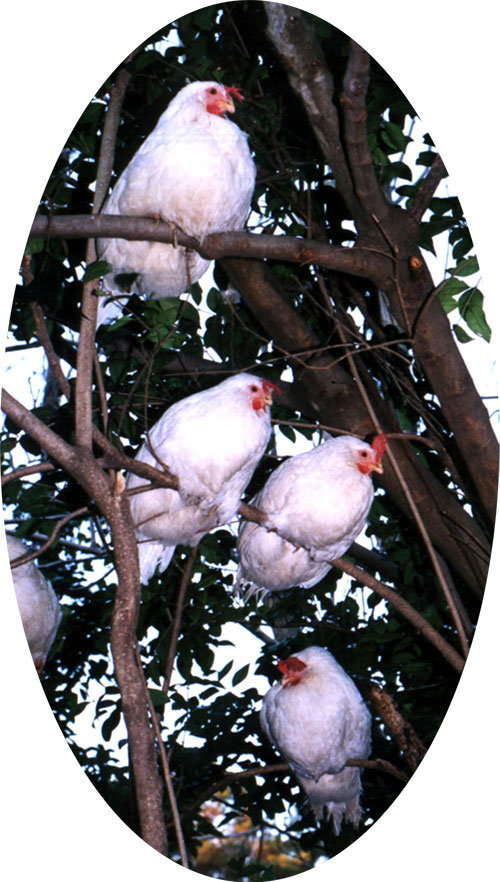Action Alert
Cypress Egg Farms Disaster: The Big and Bigger Picture
"[Chickens] have been driven from our lives and even from our consciousness by the terrible and apparently irresistible logic of technology. . . . The chicken can thus be taken as a symbol of our heedless manipulation and exploitation of the universe we live in and, particularly, of the planet we live on." –Page Smith & Charles Daniel, The Chicken Book

Photo by Susan Rayfield
In an essay on the Cypress Egg Farms Disaster published by The Humane Society of the United States, Susanne Abromaitis writes that the horrible scene she witnessed in Pasco County, Florida is "more than just a harrowing picture of a failed agribusiness. It's also a case study of a huge issue involving factory farms: When disaster strikes, who is responsible for the animals?
"By the time concerned citizens contacted the Florida Department of Agriculture, the birds had already been without food for 10 days in the Florida facility and for more than 20 days at another Cypress Foods plant in Georgia. A judge had initially refused to release company assets to feed and care for the birds until Georgia's State Agriculture Commissioner interceded, explaining what should have been obvious—that withholding food constitutes willful neglect and cruelty to animals. Food was donated by industry after the Georgia Department of Agriculture assumed responsibility for dealing with the disaster.
"In Florida, 30,000 hens are said to have died of starvation, and the remaining 170,000 were gassed and buried [except for the 300 hens who were rescued]. Of the 1.2 million birds in Georgia, approximately 426,000 were deemed "unsalvageable" and were killed by cervical dislocation and rendered; 705,000 were sent to other poultry companies; and the remaining 40,000 birds were shipped to slaughter. Inmates from a local prison were brought in to remove the dead chickens from the sheds in Florida. . . .
Gallocide
In southern California, in 1972, over 9 million hens with Newcastle disease were destroyed to stop the spread of the virus among the vast numbers of caged hens. "The killing and disposal of nine million hens is gallocide on a scale too vast for the average imagination," write Page Smith and Charles Daniel in The Chicken Book (1975; rpt. 2000) concerning this episode. "[P]erhaps the destruction in our age of millions of human beings who were thought to carry a kind of racial virus in their genes has inured us to the horror of killing so many living creatures and left us equally indifferent to the strange developments which make such a solution seem inevitable if not commonplace."
"Similar fates befell hens at the Buckeye Egg Farm in Ohio in September 2000 when a tornado struck the facility and hens were trapped in their cages, suffering from hunger and exposure. Some birds were rescued, and euthanasia attempts were made on others. But ultimately most of the birds who survived the tornado died when workers bulldozed the disaster site. . . . [That is, the hens were buried alive, which is how the U.S. egg industry disposes of millions of "spent" hens-UPC Editor].
"These disasters . . . are horrible for animals who are often valued at less than the amount of money it would take to rescue them. These disasters are also indictments of the factory farm system, which does not make allowances for animals' natural behaviors, such as foraging for food and water when none is provided. Because most producers do not have contingency plans for disasters, the onus falls on external entities, such as state agriculture agencies and animal protection organizations, to provide relief for the abandoned animals.
"The Sheriff's office in Pasco Country Florida, is considering filing animal cruelty charges against Cypress Foods. However, a disaster much like this is still likely to occur again when the next tornado, hurricane or bankruptcy threatens the animals housed in factory farms."

Florida law explicitly requires that an animal's "owner" (which can include a corporation) must provide food and water for the animals. Says the Tampa Tribune of the Cypress hens tragedy, "Florida has strict laws against inflicting cruelty on animals, either purposely or through neglect. It does not matter whether animals are pets or used to produce food. Under the law, all must be protected from such cruel treatment. Clearly, this is a case of miserable failure and neglect that requires the prosecution of those deemed responsible."
Please write to Sheriff Bob White and insist that cruelty charges be filed against Cypress Foods. Remind him that both Florida law and common decency demand that this cruelty be addressed. Contact:
Sheriff Bob White
Pasco County Sheriff's Office
8700 Citizen Drive
New Port Richey, FL 34654
Fax: 727-844-7742